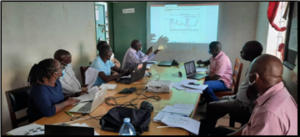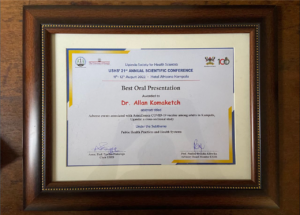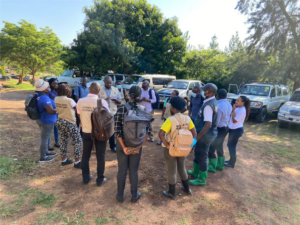 |
Dr. Allan KomakechMBCHB (Constantine), MPH (CIU), & Advanced Field Epidemiology Fellow (UPHFP) Host Site: Ministry of Health, Reproductive Health Department.Host Mentor: Dr. Robert Mutumba, Dr. Irene Mwenyango, Dr. Robert Mugahi |
||||
ABOUT THE FELLOWDr. Allan Komakech is a medical doctor, a public health specialist and now a qualified field epidemiologist. Before joining the fellowship, he pursued a medical degree in medicine and surgery (MBChB) from the University of Constantine, Algeria and Masters degree in Public Health (MPH) from Clarke International University, Kampala, Uganda. He is also currently pursuing a post graduate diploma in program planning and management. Prior to joining the fellowship, he served as a practicing medical doctor in both private and public facilities, a program coordinator for the viral hepatitis program at Lugei foundation and also as a lecturer at the school of public health of Clarke International University. During the fellowship, he was attached to the Reproductive Health Department (RHD), Ministry of Health (MoH). Consequently, his time at the host site has helped to improve my understanding of maternal and child health issues as well as adolescent and school health. The fellowship has helped Allan gain skills in advanced outbreak detection and investigation (including during the recent Ebola outbreak), scientific writing, grant and proposal writing, grant management, and oral presentation. He also developed skills in data analysis using Epi info, STATA, R and QGIS. His leadership skills have greatly improved through the situations encountered during the two years that required me to be a leader. In addition to his competencies, Allan is respectful, honest, and culturally-tolerant. The fellowship has reinforced these values and qualities of being a team player, flexible and hardworking, qualities that will help him excel as a public health specialist and field epidemiologist. Dr. Allan Komakech won the best oral presentation award at the Uganda society for health scientists conference, 2022 on the abstract presented on “Adverse events following AstraZeneca COVID-19 vaccination in Uganda, March-April, 2021”. Achievements at the Host Site
Fellowship program specific achievements
Written communication
Lead author
Co-author
Conference presentations
Summary of Epidemiological Study:Title: Assessment of adverse events following COVID-19 AstraZeneca vaccination in Greater Kampala,Uganda, March-April 2021 Background: Tracking adverse events helps to assess vaccine safety. Uganda rolled out AstraZeneca vaccination in March 2021 primarily targeting teachers, health workers, security personnel, and older persons. However, information about adverse events following the nationwide rollout of the AstraZeneca vaccination in Uganda is limited. We, therefore, assessed adverse events following AstraZeneca vaccination among adults in the Greater. Methods: We used routinely collected data about AstraZeneca vaccination to identify persons who received ≥1 dose of the vaccine. Data were collected between March 10 and April 30, 2021 through telephone interviews on a random sample of vaccinated individuals. We defined adverse events as any untoward medical occurrence after vaccination and serious adverse events as any event leading to hospitalization, persistent disability ˃28 days, death, or congenital anomaly. We summarized data descriptively, performed bivariate analysis, and determined factors independently associated with adverse events using a multivariable logistic regression. Results: We studied 374 participants aged 20-85 years and found 235 (62.8%) had received only the first dose of Astra-Zeneca vaccine while 139 (37.2%) received two doses of the vaccine. The prevalence of adverse events was 76.5% and the common adverse events included injection site redness, pain, or itching, and headache but no serious adverse event was reported. Participants aged 20–29 years (AOR 4.58; 95% CI: 1.92– 10.95), 30-39 years (AOR 3.69; 95% CI: 1.81–7.51) and 40-49 years (AOR 2.78; 95% CI 1.26–4.90) were more likely to develop adverse events compared to those aged ≥50 years. Conclusion: Adverse events is prevalent among persons vaccinated with Astra- Zeneca vaccine, largely among those below 50 years old. However, serious adverse events are rare. Persons <50 years old should be targeted for surveillance of adverse events and receive appropriate health education and counseling. Key lessons learnt during the fellowshipDuring the fellowship, I learnt and developed the following competencies:
Next StepsI hope to further my career in field epidemiology through roles in national and international organizations in disease surveillance, global health security and health program designing and implementation and building capacity. I will also ensure that all the work done during the fellowship will be published in reputable peer-reviewed journals. I will continue supporting FETP frontline and intermediate trainees as part of my capacity building roles Pictorial
|
|||||
Sign in
Sign in
Recover your password.
A password will be e-mailed to you.




